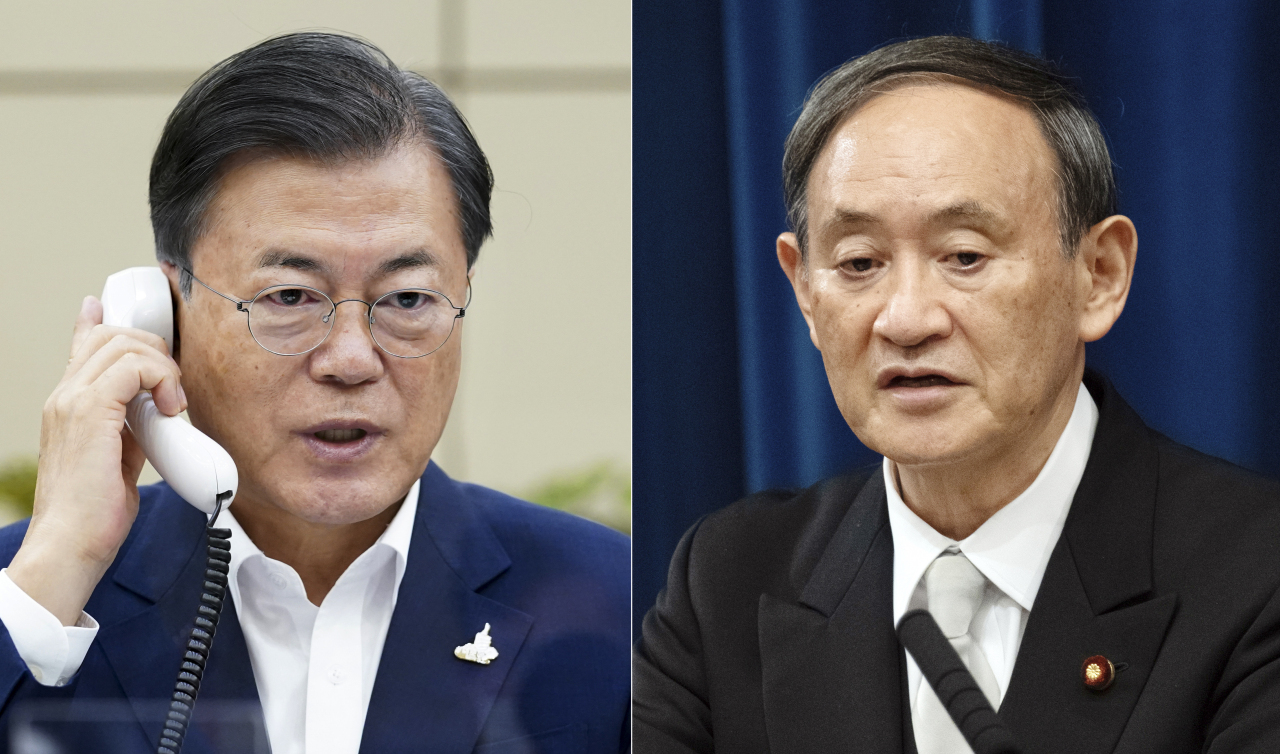Rocky Seoul-Tokyo ties expected to continue in Biden era
By Ahn Sung-miPublished : Feb. 1, 2021 - 15:38

A dramatic shift in Korea-Japan relations is unlikely, despite anticipation for change with Joe Biden taking control of the White House in the US and expected pressure from Washington for its two key Northeast Asian allies to mend ties.
For Washington, forging strong trilateral cooperation with Seoul and Tokyo is critical, as it views a security coalition of like-minded allies as central to tackling mounting challenges in the region, such as containing China’s aggression and North Korea’s nuclear ambitions.
Experts say the two squabbling neighbors could be impelled to work on their diplomatic tensions as well, which are rooted in Japan’s 1910-45 colonial rule of Korea and have morphed into an ongoing economic feud.
But a fundamental resolution of the outstanding issues would be difficult, as mediation would have limits in breaking the deep-seated mistrust between the two countries and their different political priorities and timetables.
“With Biden stressing the importance of an alliance, the three countries will make some efforts to be cooperative with each other,” said Choi Eun-mi, a Japan expert at the Asan Institute for Policy Studies in Seoul. “Washington will underscore the trilateral security cooperation in the grand scheme of its East Asian strategy and countering China, but it will be hard to expect Biden’s active role in brokering the conflict between Seoul and Tokyo, like it did in 2015.”
In 2015, the Obama administration played a behind-the-scenes role in getting Seoul and Tokyo to settle the “comfort women” issue, a euphemism for women who were forced to work in Japan’s military brothels before and during World War II -- a major sticking point that has long plagued ties between the two sides.
Biden, who served as Obama’s vice president then, traveled to both countries and met with the two leaders to bring them to the agreement. He later described his role as a “divorce counselor, putting a marriage back together” in an interview with the Atlantic.
“Back then, the issue was more of a political conflict between the two countries,” said Jin Chang-soo, a Japan expert at the Sejong Institute. “But now, it’s different, because the issue has evolved into a judiciary decision, including the latest ruling on the ‘comfort women.’ And this would make it difficult for Biden to interfere with the country’s judiciary process.”
While Washington will continue to convey the message that the two countries need to bury the hatchet and move forward, it wouldn’t be able to provide a detailed solution nor a way out of the stalemate, he added.
Then, it would ultimately be up to the two governments, led by South Korean President Moon Jae-in and Japanese Prime Minister Yoshihide Suga, to patch up their relations.
Since the end of last year, Moon has been on a mission to salvage the strained relations with Tokyo, sending a high-level official to Tokyo and banking on leadership changes in both Japan and the US helping to make a breakthrough during his less than two years left in office.
Moon’s rhetoric on Tokyo has also dramatically changed recently from his previous hard-line stance against Tokyo’s colonial past. He admitted the 2015 “comfort women” deal was an official one at a recent press conference, an about-face from when the administration effectively nullified the deal years ago, decrying it as “flawed,” for failing to reflect the desires of the survivors.
Moon also said he was “perplexed” over the recent court ruling that ordered Tokyo to pay reparations of 100 million won ($89,400) each to the 12 comfort women victims -- the first such legal ruling against Tokyo. This was a surprising remark coming from the president who has been called out for his “victim-centric” approach.
The president struck a different tone again in saying he views the possible sale of seized assets from Japanese firms to compensate South Korean victims of forced labor as “undesirable” for bilateral relations, adding the two countries need to find a diplomatic solution before such a move.
Many experts are suggesting that Moon’s change of heart points to last-ditch efforts for rapprochement with Japan, as he also seeks ways to make the upcoming Tokyo Olympics a means to improve relations with North Korea. Moon, whose presidency ends next year, hopes to replicate similar success from the 2018 PyeongChang Winter Olympics, which set the stage for renewed relations between the US and North Korea, as well as between the two Koreas.
Despite Seoul’s diplomatic overtures and shift in stance, Tokyo appears to be less interested, with Japanese Deputy Chief Cabinet Secretary Manabu Sakai saying his government “took note” of Moon’s remark, but adding that Japan would observe Seoul’s actions first.
“From the surface, Tokyo could see Seoul’s willingness to improve ties, but without detailed actions to follow up, Moon’s intention could be met with skepticism,” said Choi. “Japan could see Seoul’s suggestion as abstract and less realistic at this point, considering uncertainty with the Tokyo Olympics as well as not offering concrete steps in solving the historic dispute.”
Yun Duk-min, a former chancellor of the Korea National Diplomatic Academy, said friendly messages would not be enough, and Seoul needs to come up with an actual diplomatic and political action plan in order to deliver any kind of breakthrough.
“Japan is watching what Seoul will follow up with next, as it doesn’t have much political space to initiate anything first, with an election approaching and uncertainty over hosting the Tokyo Olympics,” said Yun.
“It would be up to the Moon administration, but with the latest court ruling on the comfort women that could aggravate the situation, Moon’s main job will be to manage relations to prevent things from heading into a nadir.”
By Ahn Sung-mi (sahn@heraldcorp.com)











![[Today’s K-pop] BTS pop-up event to come to Seoul](http://res.heraldm.com/phpwas/restmb_idxmake.php?idx=644&simg=/content/image/2024/04/17/20240417050734_0.jpg&u=)





![[KH Explains] Hyundai's full hybrid edge to pay off amid slow transition to pure EVs](http://res.heraldm.com/phpwas/restmb_idxmake.php?idx=652&simg=/content/image/2024/04/18/20240418050645_0.jpg&u=20240418181020)

![[Today’s K-pop] Zico drops snippet of collaboration with Jennie](http://res.heraldm.com/phpwas/restmb_idxmake.php?idx=642&simg=/content/image/2024/04/18/20240418050702_0.jpg&u=)